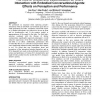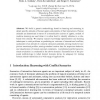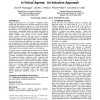402 search results - page 49 / 81 » Agent modeling with individual human behaviors |
ATAL
2006
Springer
15 years 3 months ago
2006
Springer
Intelligent agents are typically situated in a social environment and must reason about social cause and effect. Such reasoning is qualitatively different from physical causal rea...
CHI
2005
ACM
16 years 6 days ago
2005
ACM
As human-computer interaction increasingly focuses on mediated interactions among groups of individuals, there is a need to develop techniques for measurement and analysis of grou...
CHI
2007
ACM
16 years 6 days ago
2007
ACM
We performed an empirical study exploring people's interactions with an embodied conversational agent (ECA) while performing two tasks. Conditions varied with respect to 1) w...
ICCS
2007
Springer
15 years 6 months ago
2007
Springer
We build a generic methodology based on learning and reasoning to detect specific attitudes of human agents and patterns of their interactions. Human attitudes are determined in te...
109
click to vote
ATAL
2008
Springer
15 years 1 months ago
2008
Springer
Humans continuously assess one another's situational context, modify their own affective state, and then respond based on these outcomes through empathetic expression. Virtua...



